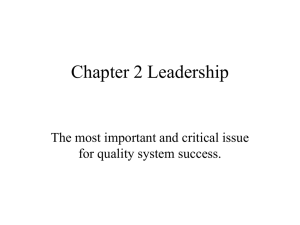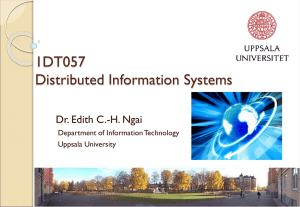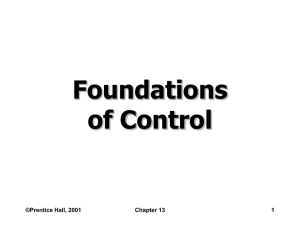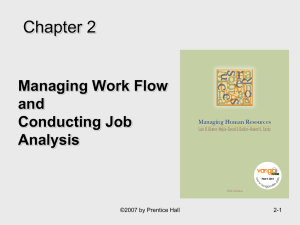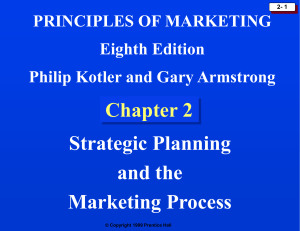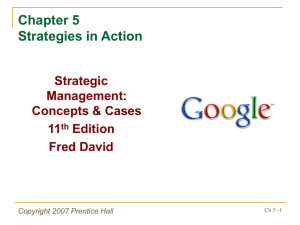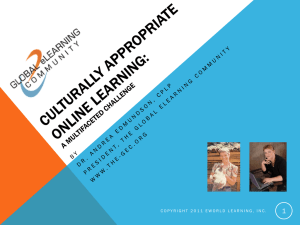CHAPTER 1
advertisement
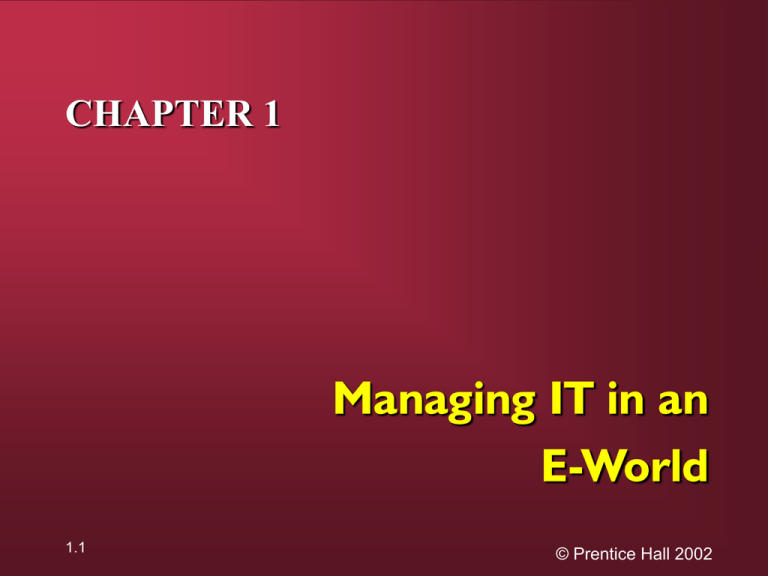
CHAPTER 1 Managing IT in an E-World 1.1 © Prentice Hall 2002 INFORMATION TECHNOLOGY • COMPUTER TECHNOLOGY (HARDWARE & SOFTWARE) • PROCESSING & STORING INFORMATION • COMMUNICATION TECHNOLOGY • TRANSMITTING INFORMATION * 1.2 © Prentice Hall 2002 eWORLD • ELECTRONIC WORLD • USE OF WORLD WIDE WEB • CHANGED RULES FOR SUCCESSFUL BUSINESS • KEY INDICATOR OF BUSINESS’ HEALTH * 1.3 © Prentice Hall 2002 INFORMATION SYSTEMS (IS) ORGANIZATION • ORGANIZATIONAL DEPARTMENT OR UNIT • HAS PRIMARY RESPONSIBILITY FOR MANAGING INFORMATION TECHNOLOGY (IT) * 1.4 © Prentice Hall 2002 INFORMATION TECHNOLOGY IN AN eWORLD • COMPUTER TECHNOLOGY: Portable technology • COMPUTER SOFTWARE: Software packages • TELECOMMUNICATIONS/NETWORKING: Global, mobile reach * 1.5 © Prentice Hall 2002 COMPETING IN AN eWORLD • TRADITIONAL WAYS: – COST: Low cost producer of good or service – DIFFERENTIATION: Enhancing perception of product or service – STRATEGIC INFORMATION SYSTEM (SIS): Sales information, just-in-time materials, better cash management * 1.6 © Prentice Hall 2002 COMPETING IN AN eWORLD • NEW WAYS: USING IT CAPABILITIES OF INTERNET – COST EFFICIENCIES – MASS CUSTOMIZATION – GLOBAL REACH * 1.7 © Prentice Hall 2002 WORKING IN AN eWORLD • KNOWLEDGE WORKERS: Information & knowledge are raw materials, as well as product of their work • TELECOMMUTER: Workers located outside regular offices, “commute” via telecommunications lines * 1.8 © Prentice Hall 2002 WORKING IN AN eWORLD • TEAMWORK: Empowered groups able to solve problems, make operational decisions using computer tools such as e-mail, groupware • ANYTIME, ANYWHERE • ACROSS ORGANIZATIONAL BOUNDARIES • VIRTUAL ORGANIZATIONS & FREE AGENTS: Temporary alliances between organizations & individuals. Free agent has special IT skills, works as independent contractor free from organizational politics * 1.9 © Prentice Hall 2002 WORKING IN AN eWORLD SOCIAL IMPACTS: • JOBS: Computers cost-efficient, superior at analyzing data, add to manager’s abilities to make decisions • INDIVIDUAL PRIVACY: Need to maintain privacy of employees, customers; requires education about policies and monitoring practices * 1.10 © Prentice Hall 2002 WORKING IN AN eWORLD SOCIAL IMPACTS: • POTENTIAL IMPACTS ON SOCIETY: – – – – Low unemployment rates Increased government tax surpluses Increasing gap between “haves” & “have nots” Internet has brought access to information & services to many – Better healthcare * 1.11 © Prentice Hall 2002 ROLE OF INFORMATION SYSTEMS ORGANIZATION FIVE ERAS: • ACCOUNTING ERA (1950-1960s) • OPERATIONAL ERA (mid 1960s) • INFORMATION ERA (late 1970s-mid 1980s) • NETWORK ERA (mid 1980s on) • INTERNET ERA (mid 1990s on) * 1.12 © Prentice Hall 2002 ROLE OF INFORMATION SYSTEMS ORGANIZATION • MANAGING IT ASSETS: Technology, relationship, human assets. Assets capture, process, store, make available data to knowledge workers • IT MANAGEMENT ROLES: – IT leaders (chief information officer). – Other IS managers (for IS activities such as data centers, new applications, planning, implementing IT solutions). 1.13 * © Prentice Hall 2002 ROLE OF INFORMATION SYSTEMS ORGANIZATION • IT MANAGEMENT ROLES: – Other IS professionals • Programmers • Software engineers • Systems analysts • Database developers • Web developers • Local area network administrators • Technical support providers 1.14 * © Prentice Hall 2002 ROLE OF INFORMATION SYSTEMS ORGANIZATION • BUSINESS MANAGER: User of IT to run business better. May serve as: – Member of IT steering committee – Sponsor or “owner” of new project – Process or functional expert on project team – Participant in planning, executing rollout of new application 1.15 * © Prentice Hall 2002 END-USER • BOTH IS AND NON-IS SPECIALISTS • MUST BECOME IT-KNOWLEDGEABLE • CAN BE MEMBERS OF IT PROJECT TEAMS • EVALUATE APPLICATIONS FROM ENDUSER PERSPECTIVE * 1.16 © Prentice Hall 2002 CHAPTER 1 Managing IT in an E-World 1.17 © Prentice Hall 2002

